Enroll Now and Get Upto 30% Off
* Your personal details are for internal use only and will remain confidential.

Last updated 18/03/2025
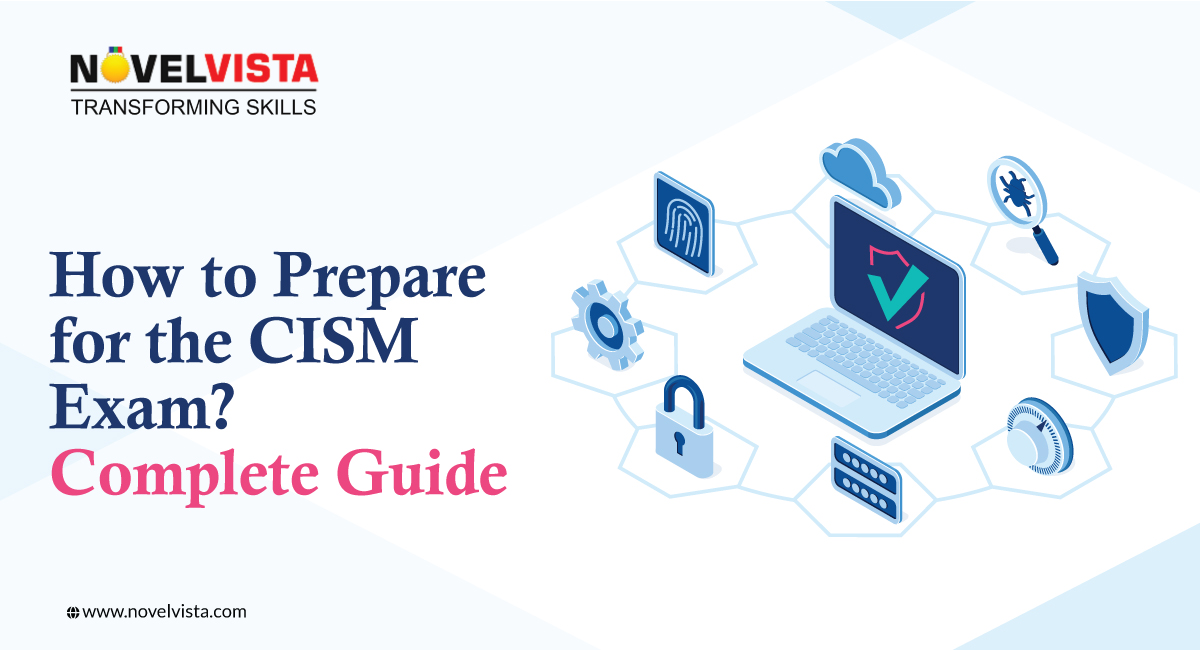
Certified Information Security Manager is an advanced level of certification which means an individual has all the knowledge and experience that a manager requires to design and implement an enterprise information security program.
ISACA, a non-profit organization, offers the Certified Information Security Manager (CISM) certification. It's also accredited by ANSI under ISO/IEC 17024:2003. The CISM exam stands out among others for its focus on security governance, risk management, and aligning security strategies with business objectives.
This certification will enable you to acquire abilities and learning that will answer any question about managing an enterprise's information security system. Whether you are a seasoned security manager or an IT professional looking to move ahead, attaining the CISM exam requires strategy.
The CISM examination is a great way to prove your skills if you plan to enter a cybersecurity leadership role. This globally recognised certification, offered by ISACA, helps IT professionals move from technical roles to security management. This guide will walk you through everything you need to know, including exam format, costs, preparation tips, and career benefits, whether planning to take the exam soon or even just exploring your options.
The Certified Information Security Manager (CISM) certification is designed for professionals who manage and oversee information security programs. Unlike technical certifications, CISM focuses on leadership, teaching you how to align security strategies with business goals.
For structured learning, check out the CISM Certification Training Course Internal Linking with Redirect to help you prepare effectively!
Before signing up for the CISM exam, make sure you meet the eligibility criteria:
Want to get started? Visit Novelvista Internal Linking with Redirect for expert-led CISM training courses that can help you prepare.
It’s important to understand how the test is structured before starting your CISM exam preparation.
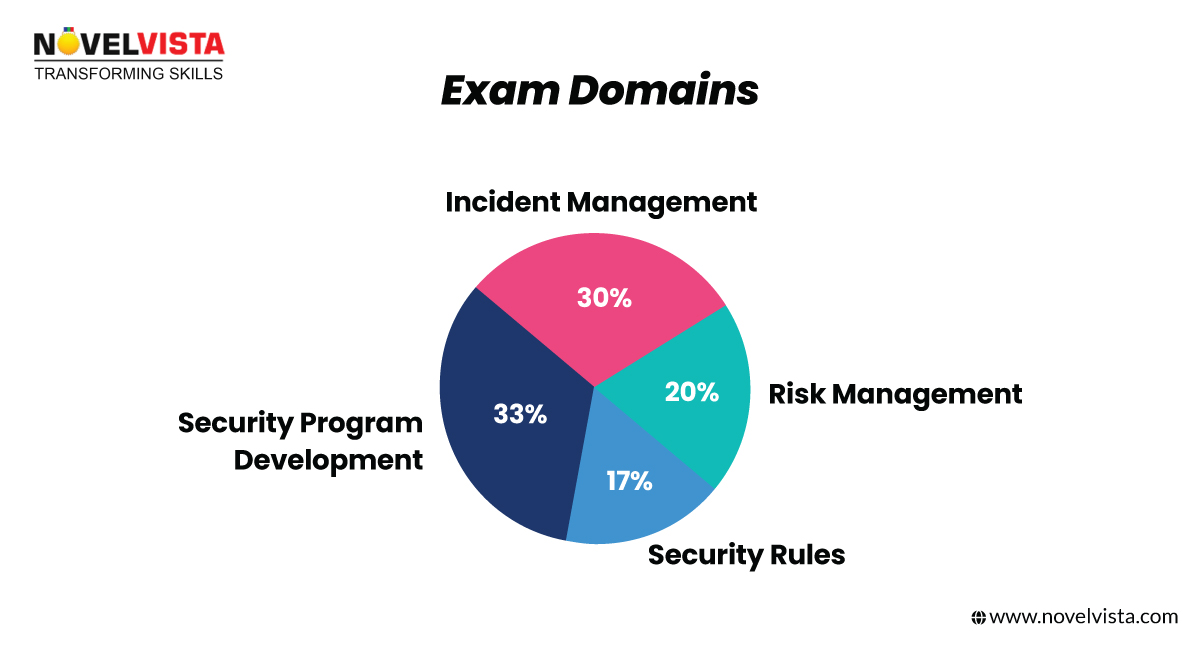
Understanding the CISM exam format will help you plan your study sessions better and focus on key areas.
The Certified Information Security Manager or CISM exam is a globally recognized certification designed for professionals focused on managing and governing enterprise information security.
The CISM is an affirmation of expertise in core information security facets: security governance, risk management, program development, and incident management. While technically focused, this certification emphasizes as much attention to security's alignment with business objectives.
A CISM professional possesses the belief in individuals' perceptions of the inclusion of security strategies with other main business objectives; they are best suited for people seeking a career change into management or as leaders in cyber security.
The CISM examination consists of 150 multiple choice questions to be completed in 4 hours i.e. 240 min. The passing criterion is 450 points and the total marks are 800 points. It covers 4 domains essential to information security management as follows:
Information security governance is 17% which sets up the governance framework and aligns security policies with the organization's goals. Then there is information risk management at 20%, which basically requires the individual to be able to identify, assess, and manage security risks.
Information Security Program Development is 33% to which concerns include developing and maintaining effective security programs within an enterprise, and then there's Incident Management, which accounts for 30% of how you are going to effectively manage and respond to security incidents, crisis management, and post-incident analysis.
The CISM exam preparation takes productive study techniques and planning. Here are some tips to help you succeed:
Check out a CISM study guide and cybersecurity interview questions Internal Linking with Redirect to get a structured plan for your preparation.
Building a strong study plan for the CISM exam is crucial for success. Start by reviewing the official exam syllabus and breaking it down into manageable sections. Allocate specific study times for each domain, focusing more on areas where you're less confident.
After all this, you need to make good use of his or her time. There are 3 options for study timelines that you can use, depending on your schedule and preference for learning:
The CISM Review Manual and the ISACA Candidate Guide are of incredible usefulness. These products provide the most inclusive view of each domain and constitute the major part of your study package.
For ISACA, third-party applications such as video courses, online forums, or study groups can be some alternate perspectives, and they will help you at every step of your preparation process. You should join study groups to spread knowledge and discuss tougher subjects with fellow participants.
Seating for the practice tests is important to assess your knowledge of the material and to get a feel for what you will be doing on test day. Seated practice tests also mirror actual exam conditions by allowing you to practice under timed conditions, sharpening your time-management skills and reducing your anxiety on the actual test. Regular mock tests also enable you to pinpoint those areas where more work has to be done.
Self-study is cost-effective and offers convenience, but it involves strict discipline and organization. Instructor-led courses are structured with an expert guiding them, yet they grant the student to earn everything plus much more than that. Accredited training providers provide clear elaborations of the most complex subjects so learners may learn the challenging subjects without much exertion. Choose an approach that suits your method of learning and schedule.
Effective learning techniques can boost your preparation for the CISM exam. Practice exams help familiarize you with the exam format and improve time management.
It will not be a matter of memorization but also an application of knowledge to real life. Try and focus on knowing rather than memorization. You can make use of flashcards and mind maps that help you remember key topics and concepts.
Joining study groups and forums can greatly enhance your CISM exam preparation. These platforms provide opportunities to discuss difficult concepts, share study resources, and gain insights from others' experiences.
Study groups or online forums based in communities can help you get deeply into the concepts from the material. LinkedIn or ISACA's community forums can bring you together with experts and other CISM aspirants, where you may be able to clear your doubts and acquire valuable insights you may not gain from reading textbooks.
As the exam date is approaching, be sure to simulate real exam conditions with full-length practice tests, thereby developing your ability to manage time across domains. It also helps you to build your endurance for concentrating during the 4-hour exam.
Domain-specific preparation is essential for excelling in the CISM exam, as it covers 4 key areas, Information Security Governance, Risk Management, Information Security Program Development and Management, and Incident Management.
To lead this arena, one must be guided by the principles of establishing a security governance framework. You will learn how to develop security policies that are in line with business objectives and compliance with regulations.
Risk management is vital in maintaining organizational security. You must know how to identify, assess, and mitigate risks. Pay particular attention to techniques such as risk analysis and mitigation strategies.
This area involves creating and leading an information security program that supports business operations. Best practices include developing security controls, continuous monitoring, and ensuring compliance with security standards.
Incident management would encompass the knowledge of how incidents are handled and security incidents, crisis management, and post-incident review. You should be able to outline how you would act swiftly to mitigate loss and ensure business operations.
Preparation for exam day is crucial for success in the CISM exam. Start by getting a good night's sleep before the test to stay alert and focused.
In the last hours before the exam, do not cram new material. Cram key concepts that you should remember instead, and most of all, sleep tight. Make sure that you get enough rest so that you are sharp and alert enough for the test.
It is very important to manage stress levels because, during the exam, you need to be focused. Having deep breaths and short mental exercises can help calm the nerves and keep one centered during the testing period.
Manage your time well and you will reap the benefit of the results of your exam. Distribute time according to the weightage provided to each domain and do not spend much time on tricky questions. Mark it and come back if needed.
After completing the CISM exam, it's essential to maintain your momentum and continue your professional development.
The CISM exam is scored on a scaled scoring system. Take the time to read over the comments given to you when you receive your exam scores, especially if you did not pass on the first attempt. Knowing why you did not pass can be very useful as you continue to plan what you must focus on studying going forward.
After passing the exam, you have to forward your work experience and complete an application for certification. For attaining your CISM certification, you have to fulfill the requirements of five years of work experience and all the documentation submitted has to be accurate.
Achieving the CISM certification is just the beginning of long-term success in information security management. Beyond the exam, continuously update your knowledge by staying current with industry trends, emerging threats, and evolving technologies.
In order to ensure your CISM designation, you are obligated to obtain Continuing Professional Education (CPE) credits every year. For this, you can utilize ISACA's community for seminars, webinars, and professional events.
Obtaining a CISM certification unlocks a complete range of career opportunities in information security management, such as Information Security Manager, IT Risk Manager, and Chief Information Security Officer (CISO). Certified professionals holding the CISM salary prospects are typically higher than average. These are similar to the market's demand for skill sets.
Getting CISM certified opens doors to high-paying job roles in banking, healthcare, government, and tech companies.
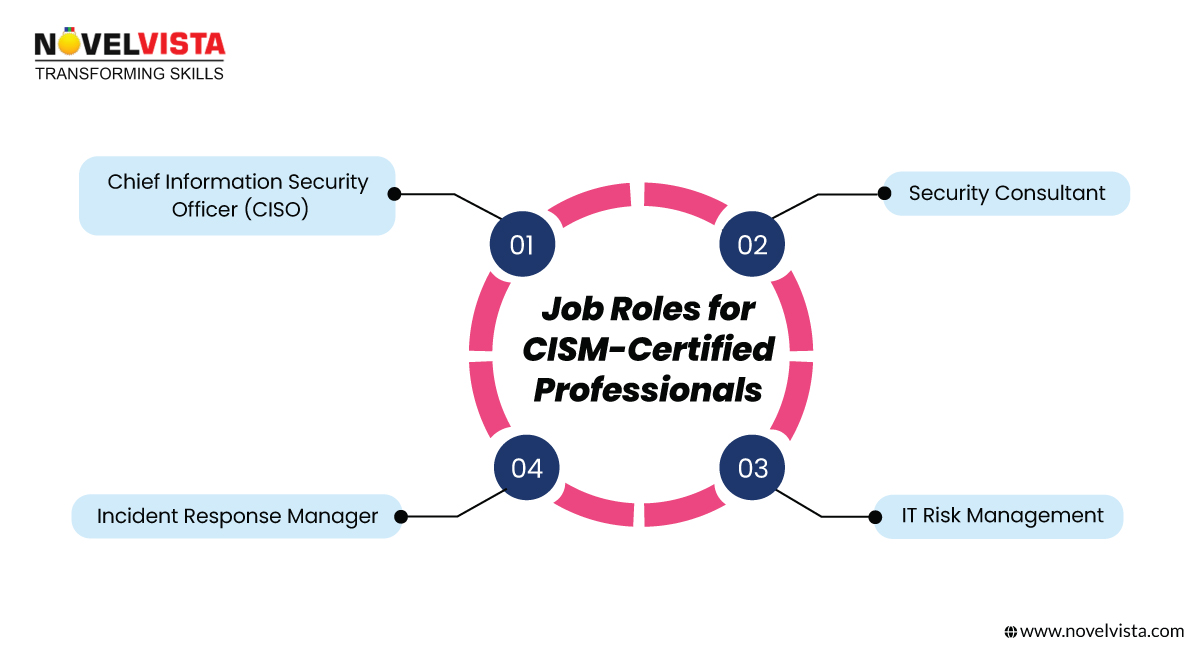
The Future of Cybersecurity Internal Linking with Redirect is growing fast, and companies need skilled security managers now more than ever!
If you're considering multiple certifications, here’s how CISM compares with others:
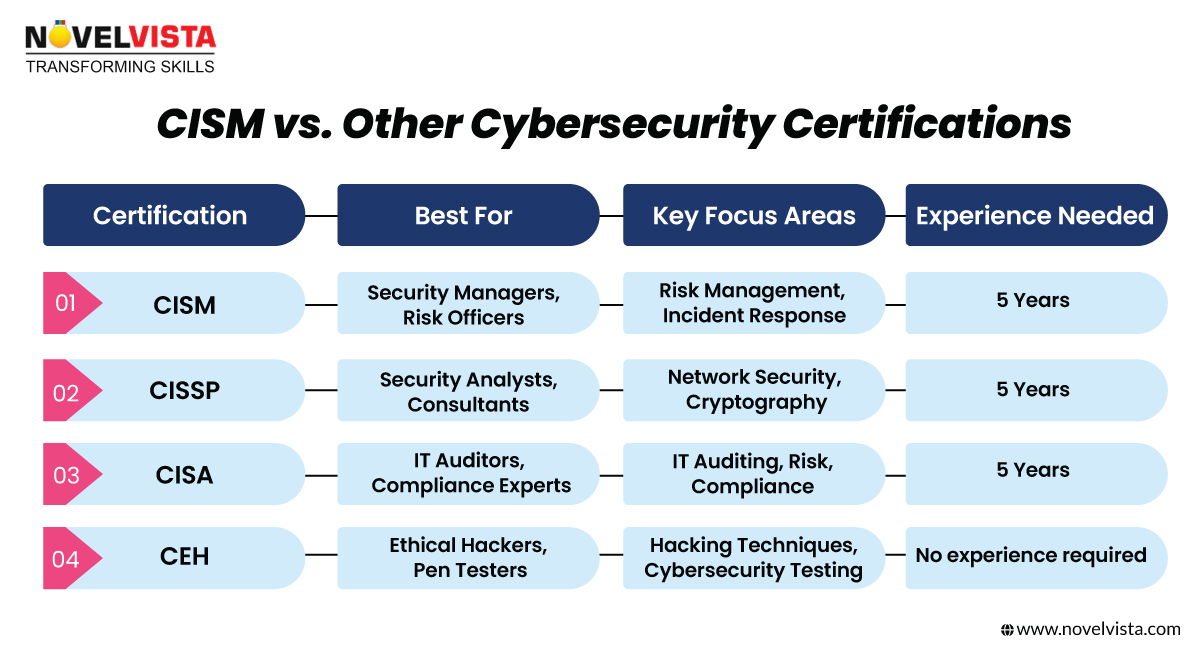
Once you earn your CISM certification, you must maintain it by following ISACA’s renewal rules:
For updates on cybersecurity policies, check out the Security Council Internal Linking with Redirect and stay informed about industry trends.
Preparation for the CISM exam requires a structured study plan that incorporates a clear timeline and defined milestones, allowing candidates to effectively cover each of the exam's key domains. Consistency in the learning process is important; setting aside dedicated study time each day or week helps reinforce knowledge and build retention over time.
Using the right approach, you will not only sit and ace the exam but also get knowledge that could be very useful for your career in information security management.
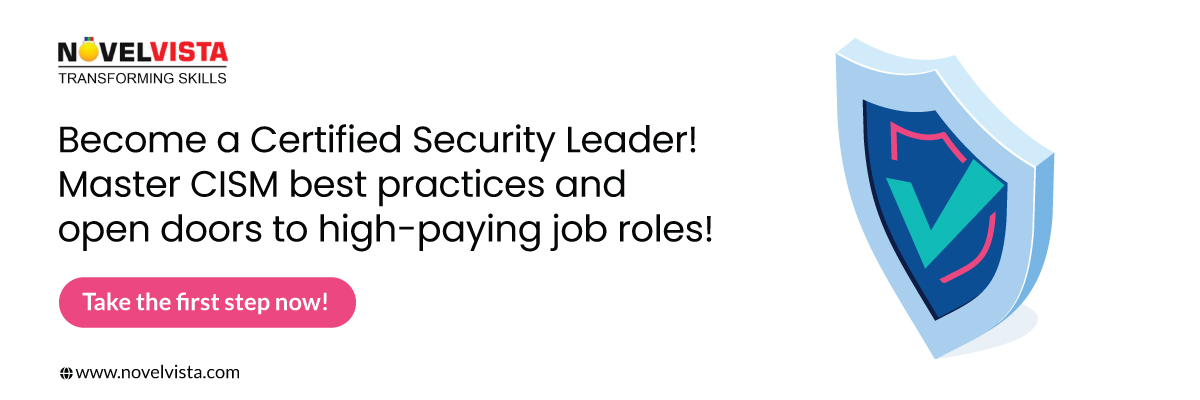
The CISM exam is an excellent opportunity for IT professionals who want to move into cybersecurity management. From higher salaries to global recognition, this certification can boost your career and open exciting job opportunities.
Start with the CISM Certification Training Course today and take your cybersecurity career to the next level!
Topic Related PostNovelVista Learning Solutions is a professionally managed training organization with specialization in certification courses. The core management team consists of highly qualified professionals with vast industry experience. NovelVista is an Accredited Training Organization (ATO) to conduct all levels of ITIL Courses. We also conduct training on DevOps, AWS Solution Architect associate, Prince2, MSP, CSM, Cloud Computing, Apache Hadoop, Six Sigma, ISO 20000/27000 & Agile Methodologies.
* Your personal details are for internal use only and will remain confidential.